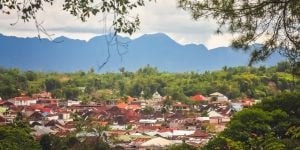
Medical infrastructure has long been a major concern in the country. The country's health system, split between private (fee-paying) and public, was notably sustained by NGOs. However, as of January 2014, the government launched major changes to the national health system.
For instance, one of these reforms involved the introduction of a universal health insurance scheme known as Jaminan Kesehata Nasional (JKN), which aims to democratize access to basic medical treatment and health institutions in Indonesia. Under this program, all working Indonesian residents now have access to free health care. According to local legislation, it is mandatory for anyone working in Indonesia to join this program. By 2022, approximately 84% of the archipelago's population will be under the JKN, both Indonesian citizens and expatriates.
The idea is that under the JKN scheme, all citizens are entitled to access a wide range of healthcare services provided by both public facilities and private organizations that have chosen to join the plan. However, the premiums on these government-mandated insurance plans are still quite low, and the surge of people with serious medical conditions is putting additional pressure on the country's medical facilities.
So far, the program has not achieved the desired success, and the quality of healthcare in Indonesia is still not there. People living in rural areas and expatriates, for example, must travel to the big cities to receive treatment. Moreover, outside of the major metropolitan medical facilities, the majority of local doctors do not speak any foreign language.
Public hospitals and private clinics in Indonesia
The Indonesian archipelago counts 1,026 public hospitals. However, if you have a health issue during your stay in Indonesia, it is strongly recommended that you go to a private clinic for treatment. As already mentioned, standards in Indonesian public hospitals are far from being at par, and these facilities are always crowded and severely understaffed. Furthermore, hygiene can also be a serious issue in these public hospitals, resulting into many patients contracting all sorts of nosocomial infections.
Another problem with Indonesia's public health facilities is the lack of equipment, especially for the treatment of serious diseases such as cancer. Patients suffering from such ailments need to travel to neighboring countries such as Malaysia for treatment, and only if they can afford it or have good medical coverage. Moreover, it should be mentioned that most of the country's best health professionals work in the private sector.
These problems in public hospitals have led to a rather unusual situation in Indonesia. Actually, private clinics outnumber public health facilities, which is a rare enough phenomenon in the world to be mentioned here. There are, indeed, 1,787 private clinics in the country, which is way over 700 more than the public sector. Some of these clinics have joined the national health coverage scheme, JKN, but they are still relatively few.
The care, services and facilities in private facilities are generally far better than those provided by public hospitals. However, with regard to the large number of private clinics, care quality can vary greatly from one clinic to another. Moreover, private clinics are notoriously expensive and are located in large urban centers, as are hospitals.
This has led to a sharp imbalance in healthcare services between urban and rural areas. The latter are either not serviced at all or are mainly serviced by small regional clinics. For this reason, Indonesians living in the most remote areas still tend to indulge in self-care through traditional medicine practices.
Should you live in a sparsely populated area or plan to relocate to Indonesia, we recommend that you inquire about the nearest health facilities to your residence. Some remote and/or sparsely populated areas or islands may be reached by helicopters in case of a necessary evacuation, but this is not the case everywhere. Since accidents and emergencies in Indonesia are not uncommon, it is advisable to take out a solid private health insurance policy, apart from the mandatory JKN.
Health insurance in Indonesia
Indonesia requires foreigners residing in the country to take out health insurance with a licensed insurer. As for the national health scheme, it is levied on each employee's income as follows: 1% is paid by the employee and 4% by the employer.
As a general rule, foreigners relocating to Indonesia for professional reasons carry additional private insurance that includes family members should they also reside in Indonesia. To ensure that you are in good standing, check with your employer about the specifics of the local plan and any additional coverage your company may offer before moving.
It is recommended that expatriates take out an international health insurance plan. This type of policy will cover its beneficiaries during their entire stay abroad, including in Indonesia. Depending on the type of plan chosen, the beneficiary of such insurance can choose any hospital or doctor.
Good to know:
It is strongly advisable, particularly for an expat, to choose an insurance policy that also includes medical evacuation. This will ensure that, if and when necessary, the beneficiary is transported to any appropriate medical facility. Such security is especially essential if you wish or need to move to Indonesia, even if it will sensibly increase the cost of your insurance policy. In Indonesia, emergency medical evacuation is normally done by helicopter, but be aware that some of the more remote islands in the archipelago are not covered by this service. In addition, many foreign professionals choose to travel to neighboring countries (such as Singapore, Malaysia, or Thailand) for medical treatment due to the inadequacies of the Indonesian health care system.
Health risks in Indonesia
There are a number of health risks in Indonesia, but many of them can be avoided with good hygiene and by taking preventive measures as well. For example, before eating anything in the street, verify that the meat is well cooked and choose perfectly sealed bottles for drinking purposes.
Polio outbreaks have been reported in Java and Sumatra in recent years. It is, therefore, recommended that you obtain a polio vaccine before traveling to these areas and ensure that you are up to date with all your immunizations.
Living in Indonesia increases the risk of contracting malaria, dengue, chikungunya and zika virus.
Protect yourself from mosquitoes by wearing long sleeves and pants at night and spraying effective mosquito repellent. Remove any standing water in your home and turn on a fan to keep mosquitoes away.
Rabies is still prevalent in Indonesia, where stray dogs are common, as well as other wild animals like chimpanzees. As a rule of thumb, avoid contact with animals and seek medical attention without delay if you are scratched or bitten.
During the dry season, which runs from May to November, forest fires can cause increased air pollution, and the smoke can significantly affect your health. Remember to wear a mask during this time and contact a doctor if you have respiratory problems.
Health centers in Indonesia
When it comes to healthcare, Jakarta is the best-equipped city in the country. In comparison, none of the public hospitals in the archipelago meet international standards. The International SOS and Global Doctor websites, which are popular among expatriates, will direct you to the nearest medical center in Indonesia. Global Doctor offers consultations via teleconference with doctors located in Australia.
Medistra is another option for finding private hospitals in Indonesia.
What to do in case of a medical emergency in Indonesia?
Should you require emergency medical assistance in Indonesia, call 112 to request an ambulance. However, due to the heavy traffic in some large cities, it may be better to go to the nearest private clinic or hospital on your own. You can then contact your insurance company if you need treatment.
Important:
Indonesia is notorious for being plagued by natural disasters, such as earthquakes, volcanic eruptions, cyclones and tsunamis. In the event of a natural disaster, one needs to follow all of the government guidelines to ensure maximum safety.
The risk of terrorist attacks is also high in Indonesia, although the authorities have made great efforts to counter this threat recently. The country still has several Islamist extremist organizations to this day, and during the last decades, Indonesia has witnessed several deadly attacks, like the Bali bombings in 2002, which killed 202 people (mostly foreigners).
Throughout the years, expats and tourists in Indonesia have become the target of terrorist attacks. Remain cautious and check the media or embassy websites in Indonesia regularly for information on potential terrorist threats.
Covid risk in Indonesia
Covid-19 has had a devastating impact on Indonesia. From the outbreak's start to May 2022, well over 6 million people were infected with the virus, with approximately 157,000 deaths. Fortunately, cases have declined sharply after a strong surge between February and April 2022. To date, 200 to 400 new cases are being reported daily across the archipelago, compared to over 50,000 per day during the peak of the last wave.
The country's borders were gradually reopened to foreign travelers by the end of 2021. Vaccinated persons are no longer required to stay in quarantine, but this measure is still required for non-vaccinated persons. There are several hospitals and/or hotels that are still used as quarantine centers by the government.
At least ten Covid-19 vaccines are available in Indonesia. They are: BioNTech (Pfizer), CanSino, CoronaVac, Johnson & Johnson, Moderna, Novavax, Oxford (Astrazeneca), RBD-Dimer, Sinopharm and Sputnik V. Anyone over the age of 6 is eligible for vaccination there. At the time of updating this article, 405 million vaccine doses had been administered nationwide, with more than 165 million people fully vaccinated, including the booster dose. This accounts for approximately 62% of the local population, and as such, the Indonesian vaccination campaign is recognized as the most extensive in the entire Southeast Asian region.
In terms of health measures, the government has implemented a four-level alert system known as the Pemberlakuan Pembatasan Kegiatan Masyarakat (PPKM), level 1 being the lowest and level 4 the highest. Since mid-May 2022, the alert level was progressively brought down by the authorities in most of the regions and localities of the archipelago. Currently, most major cities and urban centers are at level 1 or 2. At this stage, masks are no longer mandatory outdoors.
However, it is advisable to check the alert level before moving to your region of residence, as there are severe punishments for those who do not abide by the health measures in Indonesia.
Useful links:
We do our best to provide accurate and up to date information. However, if you have noticed any inaccuracies in this article, please let us know in the comments section below.











